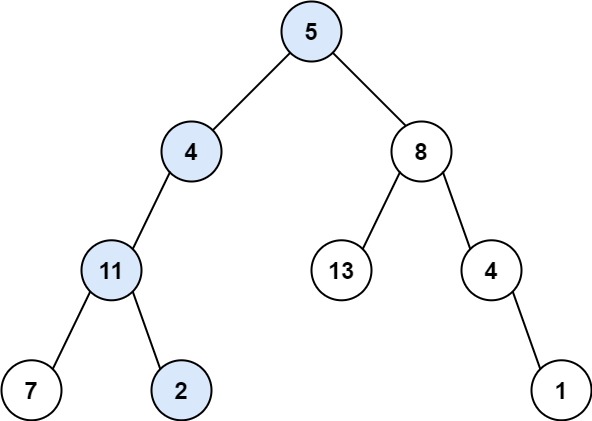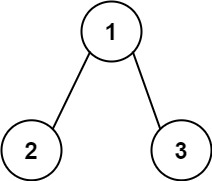Algorithm
Problem Nmae: 112. Path Sum
Given the root of a binary tree and an integer targetSum, return true if the tree has a root-to-leaf path such that adding up all the values along the path equals targetSum.
A leaf is a node with no children.
Example 1:

Input: root = [5,4,8,11,null,13,4,7,2,null,null,null,1], targetSum = 22 Output: true Explanation: The root-to-leaf path with the target sum is shown.
Example 2:

Input: root = [1,2,3], targetSum = 5 Output: false Explanation: There two root-to-leaf paths in the tree: (1 --> 2): The sum is 3. (1 --> 3): The sum is 4. There is no root-to-leaf path with sum = 5.
Example 3:
Input: root = [], targetSum = 0 Output: false Explanation: Since the tree is empty, there are no root-to-leaf paths.
Constraints:
- The number of nodes in the tree is in the range
[0, 5000]. -1000 <= Node.val <= 1000-1000 <= targetSum <= 1000
Code Examples
#1 Code Example with C Programming
Code -
C Programming
#include <stdio.h>
#include <stdlib.h>
#include <stdbool.h>
struct TreeNode {
int val;
struct TreeNode *left;
struct TreeNode *right;
};
bool hasPathSum(struct TreeNode *root, int sum) {
if (root == NULL) {
return false;
}
int remain = sum - root->val;
if (root->left == NULL && root->right == NULL && remain == 0) { /* leaf */
return true;
}
if (hasPathSum(root->left, remain) || hasPathSum(root->right, remain)) {
return true;
}
else return false;
}
void printTreePreOrder(struct TreeNode *p) {
if (p != NULL) {
printf("%d", p->val);
printTreePreOrder(p->left);
printTreePreOrder(p->right);
}
else printf("#");
}
int main() {
struct TreeNode *t = (struct TreeNode *)calloc(4, sizeof(struct TreeNode));
struct TreeNode *p = t;
p->val = 1;
p->left = ++t;
t->val = -2;
t->left = t->right = NULL;
p->right = ++t;
t->val = 0;
t->left = t->right = NULL;
printTreePreOrder(p); printf("\n");
printf("%d\n", hasPathSum(p, 1)); /* should be true */
printf("%d\n", hasPathSum(p, 0)); /* should be false */
printf("%d\n", hasPathSum(p, -1)); /* should be true */
return 0;
}
Input
Output
#2 Code Example with C++ Programming
Code -
C++ Programming
class Solution {
public:
bool hasPathSum(TreeNode* root, int sum) {
if(!root) return false;
sum -= root->val;
if(!sum && !root->left && !root->right) return true;
return hasPathSum(root->left, sum) || hasPathSum(root->right, sum);
}
};
Input
Output
#3 Code Example with Java Programming
Code -
Java Programming
class Solution {
public boolean hasPathSum(TreeNode root, int targetSum) {
if (root == null) {
return false;
}
Queue < Integer> sumQueue = new LinkedList<>();
Queue nodeQueue = new LinkedList<>();
sumQueue.add(targetSum - root.val);
nodeQueue.add(root);
while (!nodeQueue.isEmpty()) {
TreeNode removedNode = nodeQueue.remove();
int removedSum = sumQueue.remove();
if (removedNode.left == null && removedNode.right == null && removedSum == 0) {
return true;
}
if (removedNode.left != null) {
nodeQueue.add(removedNode.left);
sumQueue.add(removedSum - removedNode.left.val);
}
if (removedNode.right != null) {
nodeQueue.add(removedNode.right);
sumQueue.add(removedSum - removedNode.right.val);
}
}
return false;
}
}
Input
Output
#4 Code Example with Javascript Programming
Code -
Javascript Programming
const hasPathSum = function(root, sum) {
if (root == null) {
return false
}
const obj = {
sum: 0
}
const res = []
dfs(root, obj, sum, res)
return res.indexOf(true) !== -1
};
function dfs(node, obj, target, res) {
if (node.left == null && node.right == null) {
obj.sum += node.val
if (obj.sum === target) {
res.push(true)
}
}
if (node.left) {
dfs(node.left, {sum: obj.sum + node.val}, target, res)
}
if (node.right) {
dfs(node.right, {sum: obj.sum + node.val}, target, res)
}
}
Input
Output
#5 Code Example with Python Programming
Code -
Python Programming
class Solution:
def hasPathSum(self, root, sum):
"""
:type root: TreeNode
:type sum: int
:rtype: bool
"""
if not root: return False
sum-=root.val
if not root.left and not root.right and sum==0: return True
return self.hasPathSum(root.left,sum) or self.hasPathSum(root.right,sum)
Input
Output
#6 Code Example with C# Programming
Code -
C# Programming
namespace LeetCode
{
public class _112_PathSum
{
public bool HasPathSum(TreeNode root, int sum)
{
if (root == null) return false;
sum = sum - root.val;
if (root.left == null && root.right == null) return sum == 0;
return HasPathSum(root.left, sum) || HasPathSum(root.right, sum);
}
}
}
Input
Output
